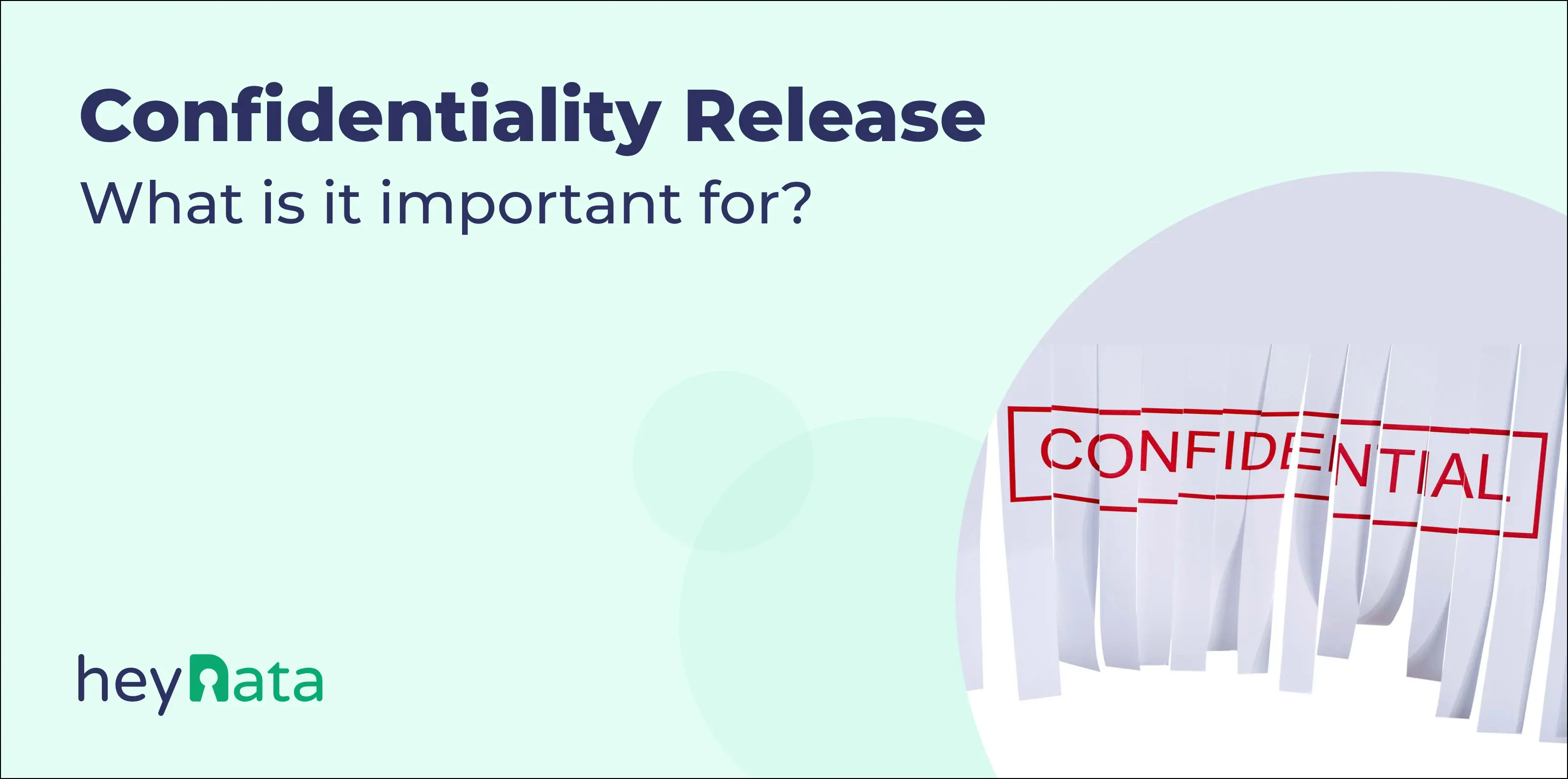
Confidentiality Release - what is it important for?

'%3e%3cpath%20d='M26.6667%2020.022L30%2023.3553V26.6886H21.6667V36.6886L20%2038.3553L18.3333%2036.6886V26.6886H10V23.3553L13.3333%2020.022V8.35531H11.6667V5.02197H28.3333V8.35531H26.6667V20.022Z'%20fill='%230AA971'/%3e%3c/g%3e%3c/svg%3e) Key findings
Key findings
The duty of confidentiality is central to the relationship of trust in professions such as doctors or lawyers. A release usually takes place when other interests prevail, such as in legal disputes. The written release clarifies who is allowed to know what and why. Data protection plays an important role here, as only certain, agreed information may be shared. Both parties should be aware of their responsibility under data protection law. This ensures that privacy is protected.
A confidentiality release is more than just a signed form - it’s the cornerstone of trust between professionals and their clients or patients. Whether you’re a physician safeguarding patient health records, a lawyer protecting attorney-client communications, or a therapist preserving session notes, understanding when and how to lawfully share sensitive information is essential. In this article, we’ll explore the duty of confidentiality, the precise elements every release must include, and how to align your practices with GDPR and broader data-protection requirements. By the end, you’ll have clear, practical guidance on crafting airtight releases that respect privacy while meeting legal and ethical obligations.
Table of Contents:
What Is a Confidentiality Release?
A confidentiality release (sometimes called an authorization to release information) is a written document by which an individual permits a professional, such as a doctor, lawyer, therapist, or priest, to share specified personal data with designated third parties. It clarifies:
- Who may receive the information
- What details can be shared
- Why is the disclosure necessary
- How long will the release remain valid
By setting these boundaries in writing, both parties understand their rights and responsibilities, crucial for preserving trust.
What Happens if this Duty is Breached?
A breach of confidentiality can have serious consequences, both for the professional and the person concerned. It can lead to legal consequences, and trust in the profession can also be affected. In some cases, a claim for damages may also be made.
When do Professionals Need to Obtain Approval?
Professionals routinely respect an absolute duty of confidentiality. Yet there are exceptions:
Legal Disputes
When court proceedings, insurance claims, or regulatory investigations arise, judges or opposing counsel may demand evidence. A signed release ensures that sensitive records (medical files, legal advice notes) can lawfully be disclosed without violating professional secrecy.
Risk Situations (Self-harm, Public Safety)
If a client poses a threat to themselves or others, many jurisdictions (and ethical codes) permit - and sometimes require - breaching confidentiality to prevent harm. Even then, a release clarifies the scope of disclosure (e.g., to emergency services, mental-health crisis teams).
Key Components of an Effective Release
An airtight confidentiality release should include:
- Identification of Parties
- The individual granting permission (e.g., “Patient: Maria Rossi”)
- The recipient (e.g., “To: Dr. Luca Bianchi; Court of Milan”)
- Purpose of Disclosure
- Clearly state why: “For use in ongoing litigation” or “To coordinate psychiatric care.”
- Scope of Information
- Specify categories: “Medical history from January 2022 to May 2025,” “Billing records,” or “Therapy session notes.”
- Duration & Revocation
- Set an expiration (“Valid until 31 December 2025”)
- Explain how the individual can revoke consent at any time—revocation does not affect disclosures already made.
- Data Security Requirements
- Outline how the recipient must store and protect the data (e.g., encrypted transfer, locked-file storage).
- Signatures & Dates
- The release taker’s signature and date
- Witness signature if required by local law
Data Protection & GDPR Considerations
Under the GDPR, personal data processing needs a lawful basis. A confidentiality release typically functions as explicit consent under Art. 6(1)(a) and, for health-related data, special category consent under Art. 9(2)(a).
- Lawful Basis: Consent must be freely given, specific, informed, and unambiguous.
- Record-Keeping: Document the request and retention period. Supervisory authorities expect clear logs of when and why you shared data.
- Revocation Rights: Data subjects can withdraw consent at any time. You must cease further disclosures, but aren’t required to undo completed transfers.
- Cross-Border Transfers: If the recipient is outside the EEA (e.g., a global law firm), ensure you have adequate safeguards (Standard Contractual Clauses, Binding Corporate Rules).
Best Practices & Practical Tips
- Use Plain-Language Forms: Avoid legalese. A one-page summary helps individuals understand at a glance.
- Digital Signatures: e-Consent platforms streamline collection and audit trails.
- Train Your Team: All staff handling releases should know data-protection obligations and secure-transfer procedures.
- Regular Audits: Review release logs quarterly to confirm compliance and spot unauthorized disclosures.
Conclusion
A well-crafted confidentiality release bridges professional ethics and legal requirements. It preserves trust by setting transparent rules for when and how sensitive information may be shared. By aligning these releases with GDPR standards - explicit consent, secure storage, clear revocation pathways - you safeguard privacy while meeting legitimate disclosure needs.


